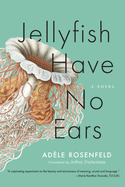
Adèle Rosenfeld's Jellyfish Have No Ears is a strange, haunting story of sensory presence and absence, language and loss, relationships and choices. Translated from the French by Jeffrey Zuckerman, this first novel follows a young woman whose limited hearing has left her always straddling the experiences of the hearing and the deaf. Her progressive hearing loss eventually poses a choice between a cochlear implant and profound deafness.
In a world she finds increasingly incomprehensible, Louise navigates work, friendship, and a romantic relationship with a hearing man. Louise is accompanied as well by characters who are hallucinations or creations of her imagination offering valuable advice. Jellyfish is bursting with sensory descriptions, including sounds heard and missed, "the warmth of timbres, this soft sheen of wind, of color, of all sound's snags and snarls." Visual details are evocative and often surprising: "eyes as blank as an ice floe after an orca had gone by with a penguin in its mouth." The effect of this unusual perspective is riveting.
Louise ponders large, philosophical questions of whether she will still be herself if she agrees to an implant. In Zuckerman's translation, Louise's voice on the page is by turns stark, stoic, and dramatic. As those around her pressure her to take the implant or to embrace deafness, Louise reveals a strong personality: fiercely obstinate and attached to her vibrant interior world.
Jellyfish Have No Ears is a curious and intensely mind-bending exploration of both the loss of a sense and the potential richness of life with an invisible disability. Imaginative and spellbinding, this novel is unforgettable. --Julia Kastner, librarian and blogger at pagesofjulia

